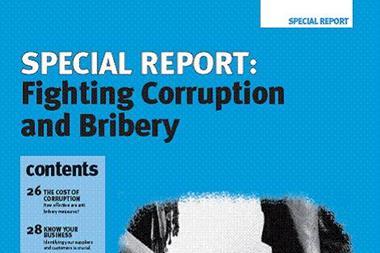But UK authorities have a long way to go to match their US counterparts
See also: Emerging markets most likely to bribe
The Financial Services Authority’s (FSA) £5.25m fine against Aon for failing to prevent bribery overseas is a step forward in the fight against corruption, but the UK authorities still have much work to do.
Unlike the US, which takes enforcement of its anti-bribery legislation very seriously, the UK has a history of shortcomings. In October last year, the Organisation for Economic Cooperation and Development (OECD) blasted the UK for its soft touch on corruption. The international organisation demanded that the UK adopt proper anti-bribery laws.
Legislation in the UK makes it very difficult for prosecutors to bring an effective case against a company for alleged bribery offenses, claimed the Paris based organisation. But the OECD did acknowledge some positive moves in the UK’s fight against corruption, including the allocation of more resources.
The latest action by the FSA against Aon, for the broker’s failure to prevent around US$7m of suspicious payments to a number of overseas firms, marks a culmination of this reinvigorated approach. It is a significant milestone and a major boost for the authority, marking as it does the largest financial crime related fine it has ever imposed.
Given the current environment it is not surprising that Britain’s financial regulator chose to bear its teeth in the fight against corruption. Outside the ‘regulated’ financial sector the UK’s enforcement authorities have had less joy when it comes to punishing companies. This recent fine stands in sharp contrast to last year’s abandoned Serious Fraud Office probe into BAE System’s alleged bribery of Saudi officials in the Al-Yamamah arms deal. Since then, the Law Commission has recommended a toughening up of the laws to prosecute companies which have failed to prevent corruption.
“[The FSA's fine against Aon] is a significant milestone and a major boost for the authority.
Margaret Cole, director of enforcement at the FSA, said: ‘This is the largest financial crime related fine imposed by the FSA to date. It sends a clear message to the UK financial services industry that it is completely unacceptable for firms to conduct business overseas without having in place appropriate anti-bribery and corruption systems and controls.’
The British fine, however, is dwarfed by the efforts of America’s regulator. Towards the middle of December last year German engineering giant, Siemens AG, and three of its subsidiaries, agreed to pay a record $1.6bn to US and European authorities for violations of the Foreign Corrupt Practices Act. According to court filings, Siemens AG engaged in systematic efforts to falsify its corporate books and records and knowingly circumvented existing internal controls.
The US authorities are worried that foreign companies earn an unfair advantage over their American rivals because in the countries where they are based the regulators are less likely to enforce anti-bribery rules. Over the past few years US regulators such as the Department of Justice and the Securities and Exchange Commission have increasingly turned their attention towards the ‘questionable’ activities of foreign companies.
According to Transparency International’s 2008 Bribe Payers Index, Britain ranks fifth in a league table of the countries least likely to have companies that engage in bribery when doing business abroad. Belgium and Canada topped the table with the cleanest record. Amongst the 26 countries listed, France, Australia, America, Spain, Italy and others, were all more likely than Britain to have companies engage in bribery overseas.
The study also revealed that banking and finance fare reasonably well when compared with other business sectors. The types of businesses most likely to pay bribes to public officials or political parties in order to influence policies were construction, property and the extractive industries.


















No comments yet